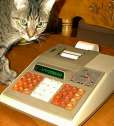Canon F-800P
| Datasheet legend
Ab/c:
Fractions calculation
AC: Alternating current BaseN: Number base calculations Card: Magnetic card storage Cmem: Continuous memory Cond: Conditional execution Const: Scientific constants Cplx: Complex number arithmetic DC: Direct current Eqlib: Equation library Exp: Exponential/log functions Fin: Financial functions Grph: Graphing capability Hyp: Hyperbolic functions Ind: Indirect addressing Intg: Numerical integration Jump: Unconditional jump (GOTO) Lbl: Program labels LCD: Liquid Crystal Display LED: Light-Emitting Diode Li-ion: Li-ion rechargeable battery Lreg: Linear regression (2-var. stats) mA: Milliamperes of current Mtrx: Matrix support NiCd: Nickel-Cadmium recharg. batt. NiMH: Nickel-metal-hydrite rech. batt. Prnt: Printer RTC: Real-time clock Sdev: Standard deviation (1-var. stats) Solv: Equation solver Subr: Subroutine call capability Symb: Symbolic computing Tape: Magnetic tape storage Trig: Trigonometric functions Units: Unit conversions VAC: Volts AC VDC: Volts DC |
| ||||||||||||||||||||||||||||||||||||||||||||||||||||||||
Canon F-800P
 This beautiful calculator (the first ever Canon programmable calculator in my collection) was a surprise in more ways than one.
This beautiful calculator (the first ever Canon programmable calculator in my collection) was a surprise in more ways than one.
For one thing, it was quite literally a surprise, a surprise gift from a stranger I never met (thank you, Wayne!)
For another, this calculator finally solved a mystery. In recent months, I came across a number of calculators with a programming model unlike any other: these included the Hanimex SPC 1090 and the Citizen SRP-80. One characteristic feature of these machines was a branch instruction that used a single-digit location argument that specified a location relative to the current program position (i.e., within plus or minus 9 steps of it; however, as I have been recently – summer 2009 – informed by Pavel Kalina from Brno, Czech Republic, you can also enter GTO - 0 to jump to the beginning of program memory.)
But Hanimex is an OEM brand. Citizen is a company known for its watches and other consumer electronics items, but it doesn't manufacture calculator chipsets. So where do these calculators come from?
Well, I know the answer now: most likely, both my Hanimex and my Citizen machines are Canon calculators in OEM disguise. The Citizen SRP-80, for instance, despite its dramatically different appearance, is functionally 100% equivalent to this Canon F-800P. In fact, thanks to this Canon machine I have discovered a few features on the SRP-80 that I wasn't familiar with before: for instance, there are several INV OUT keystroke combinations that recall a variety of scientific constants to the display.
The Canon F-800P has 10 memory registers and room for 128 partially merged program steps in four program areas. INV and HYP key combinations are merged; other multikey combinations (e.g., STO + 1) aren't. Nevertheless, the programming model is fairly powerful; sophisticated algorithms can be implemented on this machine. What a pity it isn't possible to call one program from within another, subroutine-style!
What is possible is to create an implementation of my favorite example, the Gamma function, that yields results with an impressive 10+ degrees of precision for any real number. This program uses up almost all of program memory, and also requires that six memory registers be preloaded with constants prior to execution (to enter constants to 12 digits of precision, use the + key; for instance, type 2.506628275 + 1.1 EXP +/- 10 = STO 3). To use this program, simply enter the argument and press RUN 6 (assuming of course that the program itself was entered under LRN1.)
M3: 2.50662827511 M4: 83.8676043424 M5: 1168.92649479 M6: 8687.24529705 M7: 36308.2951477 M8: 80916.6278952 M9: 75122.6331530001 × 002 1 003 STO 004 1 005 = 006 X>0 6 007 STO 008 × 009 1 010 + 011 1 012 GOTO -7 013 STO 014 0 015 × 016 RCL 017 3 018 + 019 RCL 020 4 021 = 022 × 023 RCL 024 0 025 + 026 RCL 027 5 028 = 029 × 030 RCL 031 0 032 + 033 RCL 034 6 035 = 036 × 037 RCL 038 0 039 + 040 RCL 041 7 042 = 043 × 044 RCL 045 0 046 + 047 RCL 048 8 049 + 050 RCL 051 9 052 ÷ 053 RCL 054 0 055 = 056 ÷ 057 1 058 Mo+ 059 RCL 060 0 061 ÷ 062 1 063 Mo+ 064 RCL 065 0 066 ÷ 067 1 068 Mo+ 069 RCL 070 0 071 ÷ 072 1 073 Mo+ 074 RCL 075 0 076 ÷ 077 1 078 Mo+ 079 RCL 080 0 081 ÷ 082 ( 083 RCL 084 0 085 + 086 1 087 = 088 × 089 . 090 5 091 Mo+ 092 RCL 093 0 094 ax 095 ( 096 RCL 097 0 098 - 099 5 100 = 101 ÷ 102 RCL 103 0 104 ex 105 ÷ 106 RCL 107 1 108 =


